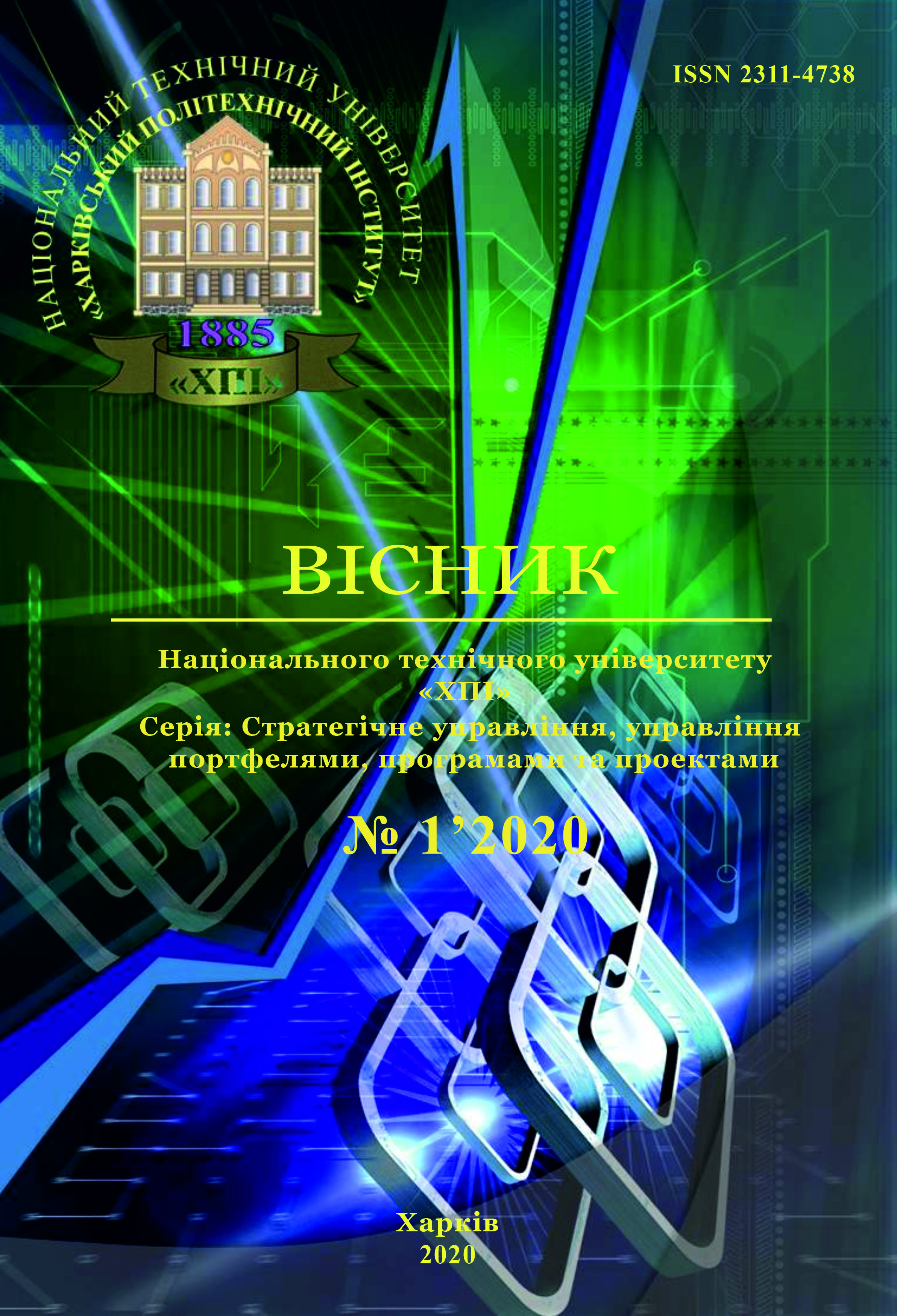INFLUENCE OF IMPLEMENTATION OF BIADAPTIVE MANAGEMENT AND FORESITE ON THE DEVELOPMENT OF COMPETENCE
DOI:
https://doi.org/10.20998/2413-3000.2020.1.9Keywords:
project management, project-organized organization, bi-adaptive, foresight, competenceAbstract
The problems of bi-adaptive management based on foresight and its impact on the competence of personnel of a project-oriented organization are described. The literary sources related to the research topic are analyzed. The previously unresolved part of the problem is highlighted. The tasks that should solve the bi-adaptive management model are formulated. Bi-adaptability is defined as the mutual adaptation of the project management system and the operational management system of a project-oriented organization for each other. Foresight models and methods for use in bi-adaptive management of project-oriented organizations are characterized. Foresight is characterized as strategic forecasting of the development of project-oriented organizations with the allocation of values and benefits based on expert assessments. An organizational structure for the introduction of bi-adaptive foresight management is proposed. Three types of relationships are proposed in the organizational structure – functional subordination relationships, hierarchical bi-adaptive management relationships, and cross-hierarchical bi-adaptive management relationships. It is proposed to include two new roles in the organizational structure - the bi-adaptive management manager and the foresight manager. An addition to the functionality of the roles involved in the project and operational management of project-oriented organizations is proposed. In this context, the roles of the project management director (head of the project office), IT director, HR manager of the project office are described. The introduction of bi-adaptive management in the work of project-oriented organizations is described. The characteristics of project-oriented organizations that undergo changes due to the introduction of bi-adaptive management based on foresight are highlighted. Their dynamics is analyzed. The influence of the proposed approach on the competence of a project-oriented organization is characterized. A conclusion is drawn on the effectiveness of the proposed approach. The prospects of further research in the chosen direction are described.References
Timinsky A. G. Tekhnolohiyi adaptyvnoho upravlinnya yak mekhanizm zabezpechennya efektyvnosti orhanizatsiyno-upravlinsʹkykh system [Technologies of adaptive management as a mechanism of support efficiency of organizational management systems]. Management of Development of Complex Systems. 2016, 27, pp. 122-131.
A Guide to the Project Management of the Knowledge. PMBOK® Guide. Sixth Edition. USA, PMI, 2017. 756 p.
ISO 21500: 2012. Guidance on project management. Project Committee ISO / PC 236. 2012, 36 p.
ISO/IEC/IEEE 12207:2017(E). ISO/IEC/IEEE International Standard – Systems and software engineering – Software life cycle processes. ISO, 2017. 145 p.
OGC (Office of Government Commerce). Managing Successful Projects with PRINCE2. TSO (The Stationery Office). United Kingdom for The Stationery Office, 2009. 327 p.
Turner M. Microsoft Solutions Framework Essentials: Building Successful Technology Solutions, Microsoft Press. 2006. 342 p.
Kononenko I. V., Lutsenko S. Yu. Evolution of the generalized body of knowledge on project management. Visnyk NTU "KhPI" [Bulletin of the National Technical University "KhPI"]. Strategic Management, Portfolio, Program and Project Management Series. Kharkov, NTU "KhPI" Publ., 2018, no. 1(1277), pp. 10–17.
IPMA Individual Competence Baseline (ICB) Version 4.0 for Project, Program & Portfolio Management. IPMA, 2015. 431 p.
IPMA Organisational Competence Baseline (IPMA OCB). Version 1.1. IPMA, Amsterdam. 2016. 105 p.
Demilliere A. S. The Role of Human Resources in Project Management. Romanian Distribution Committee Magazine. 2014, vol. 5, issue 1, pp. 36-40.
Grinchenko M. A, Ponomaryov O. S, Lobach O. V. Liderstvo v systemi povedinkovykh kompetentsiy fakhivtsya z upravlinnya proektamy [Leadership in the project management specialist's behavioral competencies]. Bulletin of the National Technical University "KhPI". Strategic Management, Portfolio, Program and Project Management Series. Kharkov, NTU "KhPI" Publ., 2018, no. 2(1278), pp. 77–83.
Voitenko O., Timinsky A., Achkasov I. Competence-based knowledge management in project oriented organisations in bi-adaptive context. Proceedings of the 2019 IEEE 14th International Scientific and Technical Conference CSIT-2019. Lviv, 2019, vol. 3, pp. 111-115.
Morozov V., Kalnichenko O. Concept of proactive IT-project management. Modern Technologies in Economy and Management. Collective Scientific Monograph. The Academy of Management and Administration in Opole. Poland, 2019. 493 p.
Morozov V., Kalnichenko O., Proskurin M. Methods of proactive management of complex projects based on neural networks. Proceedings of the 10-th IEEE International Conference IDAACS’2019. METZ, 2019, pp. 964-968.
Chernova L.S. Foresight as methodology of strategic prevision of the country and the future technology development. Theory and practice: problems and prospects: Scientific articles. Kaunas, 2019, pp. 76-84.
Downloads
Published
Issue
Section
License
Copyright (c) 2020 Олександр Георгійович Тімінський, Олександр Степанович Войтенко, Людмила Сергіївна Чернова, Любава Сергіївна Чернова

This work is licensed under a Creative Commons Attribution-NonCommercial-ShareAlike 4.0 International License.
Our journal abides by the Creative Commons copyright rights and permissions for open access journals.
Authors who publish with this journal agree to the following terms:
Authors hold the copyright without restrictions and grant the journal right of first publication with the work simultaneously licensed under a Creative Commons Attribution-NonCommercial-ShareAlike 4.0 International License (CC BY-NC-SA 4.0) that allows others to share the work with an acknowledgement of the work's authorship and initial publication in this journal.
Authors are able to enter into separate, additional contractual arrangements for the non-commercial and non-exclusive distribution of the journal's published version of the work (e.g., post it to an institutional repository or publish it in a book), with an acknowledgement of its initial publication in this journal.
Authors are permitted and encouraged to post their published work online (e.g., in institutional repositories or on their website) as it can lead to productive exchanges, as well as earlier and greater citation of published work.

